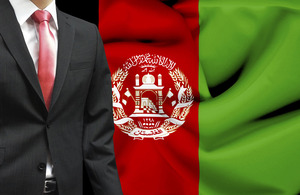 Nobody, except the United States, is really taking the current phased presidential election process in Afghanistan very seriously, especially since the top two candidates didn't win a clear majority vote after the most recent round of counting was completed April 24.
Nobody, except the United States, is really taking the current phased presidential election process in Afghanistan very seriously, especially since the top two candidates didn't win a clear majority vote after the most recent round of counting was completed April 24.The United States is taking the Afghan election seriously because it has a big stake in the country -- $1.12 billion to be exact.
That is the amount of economic assistance the U.S. has promised Afghanistan for the current fiscal year. Congress in February cut the economic aid budget in half. Of the 32,800 U.S. troops currently in Afghanistan, about 20,000 are scheduled to return to the U.S. by year end.
Meanwhile, the Washington, DC-based Center for Strategic and Budgetary Assessments (CSTC) reports the Congress has approved $243 million in direct funding for Afghan forces for the current 2014 fiscal year.
But take a look at what the U.S. provided as of March 2013--about $54 billion funding security forces in Afghanistan and $92 billion on reconstruction, agriculture, and other development projects, according to a published report from the U.S. Special Inspector General for Afghanistan Reconstruction (SIGAR).
An estimated seven million out of a total 12 million eligible voters are expected once again to cast a ballot with ink-stained fingers at the Saturday June 7 runoff vote. That will be close to a 60 percent voter turnout. According to Afghan custom, the voters cast a finger in ink to show they have voted.
It will be the country's first "democratic" transfer of presidential power.
Still, many observers aren't taking the so-called "democratic" election campaigns seriously because the two leading candidates for President Hamid Karzai's throne have been closely associated with him in the past and are likely to assume much of Karzai's thinking in the near future.
For example, Abdullah Abdullah (first and last names are the same) is an eye surgeon and former foreign minister under Karzai. He garnered 45 percent of the vote. His critics maintain Abdullah's campaign is being funded by the CIA, other private U.S. money sources and criminal drug cartels.
The CIA is reportedly behind him because Abdullah has stated publicly that if elected, he will allow U.S. military to remain in Afghanistan indefinitely. Strangely, that position flatly contradicts Karzai who is categorically opposed to any forces remaining in Afghanistan.
Abdullah's opponent in the June 7 runoff is Ashraf Ghani, the country's finance minister under Karzai. Ghani garnered 32 percent of the vote. He holds a doctorate degree from New York's Columbia University and is a former World Bank executive. Ghani is from the Pashtun ethnic group.
Zalmai Rassoul, a former civil aviation minister under Karzai, finished third with 12 percent of the vote.
The odds-on betting is that Abdullah will emerge as the new president of Afghanistan. But no matter who is elected president June 7, security will remain a key issue for the victor.
According to data from the Afghan Defense Ministry which has been widely published by world media, there were at least 700 attacks to date aimed at disrupting the current election. The bulk of the attacks were in the country's east and south, areas bordering Pakistan where the Taliban forces dominate.

 By
By 